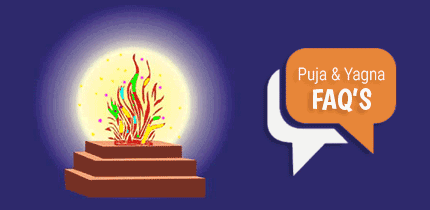
Online Yajna/यज्ञ is the act of showing reverence to a god, a spirit, or another aspect of the divine through invocations, prayers, songs, and rituals. An essential part of Puja for the Hindu devotee is making a spiritual connection with the divine. Most often that contact is facilitated through an object: an element of nature, a sculpture, a vessel, a painting, or a print.
During Puja/Online Yajna an image or other symbol of the god serves as a means of gaining access to the divine. This icon is not the deity itself; rather, it is believed to be filled with the deity’s cosmic energy. It is a focal point for honoring and communicating with the god (Online Yajna). For the devout Hindu, the icon’s artistic merit is important, but is secondary to its spiritual content. The objects are created as receptacles for spiritual energy that allow the devotee to experience direct communication with his or her gods.
In Hinduism, Puja is done on a variety of occasions, frequency and settings. It may include daily Puja done in the home, to occasional temple ceremonies and annual festivals, too few lifetime events such as birth of a baby or a wedding, or to begin a new venture (Online Yajna). The two main areas where Puja is performed are in the home and at temples to mark certain stages of life, events or some festivals such as Durga Puja and Laxmi. Puja is not mandatory; it may be a routine daily affair for some Hindus, periodic ritual for some, and infrequent for other Hindus. In some temples, various pujas may be performed daily at various times of the day; in other temples, it may be occasional.
Puja varies according to the school of Hinduism(Online Yajna). Puja/Online Yajna may vary by region, occasion, deity honored, and steps followed.
In formal Nigama ceremonies, a fire may be lit in honour of deity Agni, without an idol or image present. In contrast, in Agama ceremonies, an idol or image of deity is present. In ceremonies, a diya or incense stick may be lit while a prayer is chanted or hymn is sung. Puja is typically performed by a Hindu worshipper alone, though sometimes in presence of a priest who is well versed in procedure and hymns. In temples and priest-assisted event Puja, food, fruits and sweets may be included as offerings to the deity, which, after the prayers, becomes Prasad – blessed food shared by all present at the Puja.
According to scholars, one of the earliest mentions of Puja is in the Grihya Sutras, which provide rules for domestic rites(Online Yajna). These Sutras, dated to be about 500 BC, use the term Puja/Online Yajna to describe the hospitality to honor priests who were invited to one’s home to lead rituals for departed ancestors. As Hindu philosophy expanded and diversified, with developments such as the Bhakti movement, the Vedic Puja ritual were modified and applied to the deities. As with Vedic times, the general concept of Puja/Online Yajna remained the same, but expanded to welcoming the deity along with the deity’s spiritual essence as one’s honored guest. The Puranic corpus of literature, dating from about 6th century CE, contain extensive outline on how to perform deity Puja/Online Yajna. Deity Puja thus melds Vedic rites with devotion to deity in its ritual form(Online Yajna). As with many others aspects of Hinduism, both Vedic Puja and devotional deity Puja continued, the choice left to the Hindu.
In contrast to Vedic pujas, the significance of deity pujas shifted from petitions and external goals to the experience of oneness with the deities and their spiritual essence. It became a form of yoga whose final result aimed to be the consciousness of god through homage to god. Nevertheless, even with this evolved theoretical spiritual significance, for many people, Puja/Online Yajna continued to be a vehicle to petition desires and appeals, such as for good health of one’s child, speedy recovery from illness, success in venture envisioned or such. In the structure and practice of Puja, the mantras and rituals focus on spirituality, and any petitions and appeals are tacked only to the end of the Puja/Online Yajna.


